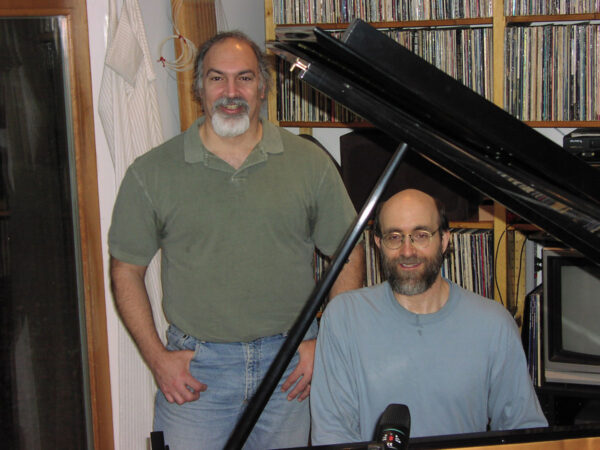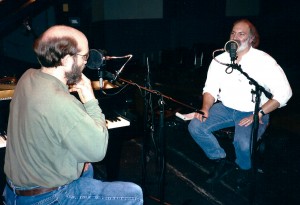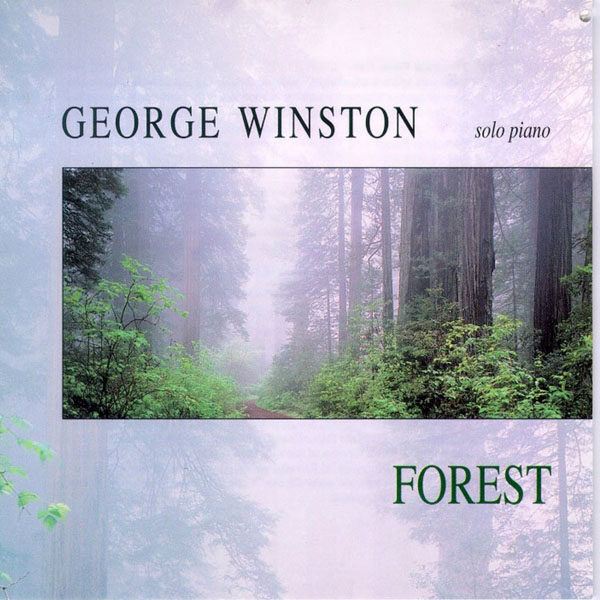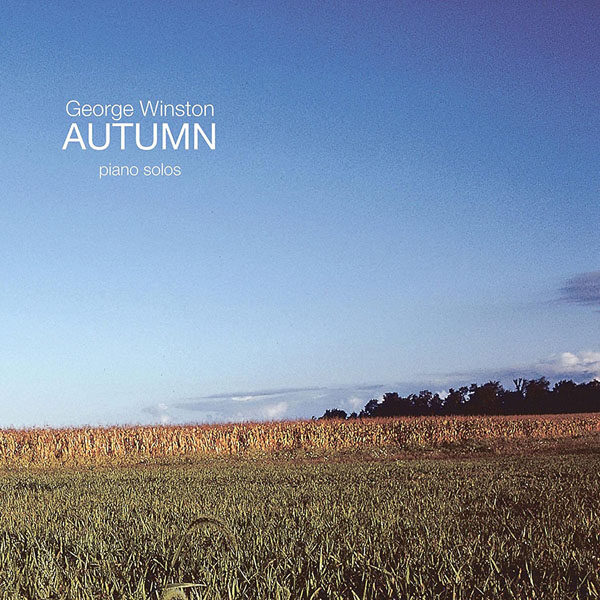George Winston Strikes the Last Chord: An Echoes Remembrance and Interview
SEASONS OF GEORGE WINSTON
by John Diliberto

John Diliberto & George Winston in Echoes Living Room I
Hear our tribute to George Winston tonight June 12, on Echoes.
On June 4th, 2023 we lost one of the giants of modern music and one of the 30 Icons of Echoes. Pianist George Winston played his final chord at the age of 74 after a long bout with cancer.
I got to know George Winston a bit. He played live on the show four times including twice in my living room and I interviewed him extensively each time. He also brought us Ray Manzarek, The Doors’ keyboardist, for an incredible concert of piano duets in the basement of Steinway Hall in New York City. It was The Doors who inspired Winston to start playing the organ. He was a music nerd of all genres and could recite compositions, composers and dates from anywhere. And he experimented with the piano, going inside to play and mute the strings directly.
I know a lot of us are crying right now. George Winston had an enormous impact on many musicians. Even Moby cites him as a seminal influence.
George Winston was both loved and reviled. His impressionistic solo piano albums came to define the Windham Hill sound and he is among the first musician most people think of when you say, New Age. Praised with five and four star reviews from Downbeat and Rolling Stone upon his Windham Hill debut album Autumn in 1980, he’s since come to be synonymous with shlock for many critics.
Winston has never felt the need to answer his detractors. In fact, until his album, Linus & Lucy: The Music of Vince Guaraldi (Windham Hill) he rarely did interviews at all. But once he starts talking, get ready for a long afternoon. The balding, bearded musician has a distracted air about him, like a reluctant professor whose mind is deep in academic arcana while a student tugs at his lab coat asking if chapter 7 will be on tomorrow’s test. But talk about one of those arcane areas of interest, Hawaiian slack key guitar for instance, and Winston would instantly perk up, happy to talk about his Dancing Cat label, founded to release the music of slack key players.
Winston’s discussions leapt from Steve Reich to demonstrations of James Booker’s stride piano style to the influences of German electronic space music like Tangerine Dream on his sound. He could talk expertly and passionately about Fats Waller one minute, relate his own Montana soundscapes to the piano playing of minimalist godfather, La Monte Young the next and then discourse on the harmonic complexity of guitarist Alex de Grassi.
However, George Winston bristled if you mention New Age in his presence. I suspect the pianist saw no irony that even playing Vince Guaraldi’s Peanuts music, he went to number one on the Billboard New Age charts.
My first interview with Winston was in 1996. He was doing a two night stand in Lebanon, New Hampshire and we were recording them for Echoes. He was 48 at the time.
JD: I know that musicians like James Booker, Henry Butler, Vince Guaraldi and Fats Waller have been influences on you and I know that their music has been a part of your live performance for years. But I think that until “Linus and Lucy” that these influences were not that readily apparent on your albums because you’re going for a much different sound?
GW: Basically I’ve got three ways of playing. Rhythm & Blues, Booker, stride piano or Fats Waller and the folk piano style. I made that one up so that’s not one I practice. That’s just came naturally to me. And it’s not that hard to play.
JD: How do you get from Fats Waller to this folk piano style?
GW: Stride piano doesn’t work for slow tunes for me that much. So I wanted to like something slow and simple and folky and have the piano sustain and ring out and have those overtones. It only works for certain tunes but those tunes have coalesced into records over time.
JD: You frequently use inside the piano techniques. How did you start developing those?
GW: Everything I do comes from like Rhythm & Blues first and then I go to the melodic folk area later. The inside techniques came from the late, great, blues player Jimmy Reed. He and a lot of other players mute the guitar with the heel of the hand so I started doing that with the piano for a left hand part and then I discovered playing melodic stuff at the piano really rings out nicely but the attack is real muted. And there are also certain African influenced tunes.

John Diliberto with George Winston 1996, Lebanon, NH
JD: You cite so many influences in there. Where is George Winston?
GW: There’s so much great stuff it took me years to narrow it down to say who I am. As a listener, I’m just much wider than as a player. I don’t have any business playing classical or Indian classical.
JD: Why not?
GW: Because you need to have been 20, 30 years doing it.
JD: Well, you could say the same thing about jazz and you’re playing Vince Guaraldi tunes and Larry Young tunes.
GW: Except I’ve been listening to those for 30 years. So I deal with the stuff I grew up as a kid. It’s so tempting to become very eclectic but I’d rather do a few things and get down as far as I can into them. The great virtuosos don’t do everything. Segovia didn’t play blues. Ravi Shankar doesn’t play mainstream jazz. That was a real clue to me. If they can’t, there’s no way I’m going to.
 JD: When you commit a whole album to one artist’s compositions, which you’ve done with Linus and Lucy: The Music of Vince Guaraldi, a musician coming from the jazz tradition, do you think people are going to listen to that album with jazz ears?
JD: When you commit a whole album to one artist’s compositions, which you’ve done with Linus and Lucy: The Music of Vince Guaraldi, a musician coming from the jazz tradition, do you think people are going to listen to that album with jazz ears?
GW: Vince Guaraldi did Vince Guaraldi as jazz. We don’t really need somebody else doing that, I don’t think. There’s a couple of his pieces I play pretty much the way he did them. Like on “Skating,” I didn’t want to do a Rhythm and Blues solo. I want to do his solo. So I treated his solo like it was the head, like it was the body and the main melody. And a song called “Remembrance,” it’s pretty much just off the record. Whereas a song like “Cast Your Fate to The Wind,” well, everybody plays their own middle and I said well, I’m going to play a folk middle. I put in a song from a great guitarist, the late Bola Sete. Vince played with him and it just so happens that part of Bola Sete’s song works in the middle of “Cast Your Fate.” It’s one of those serendipity things.
JD: How did you come across the slack key guitarists? For most Americans Hawaiian music has a corny reputation, like Don Ho resort music.
GW: Real commercial.
JD: Yeah.
GW: Chet Atkins did an album called “Alone” so of course I got it. The first song was the most beautiful thing I’d ever heard and I looked in it and it said “Hawaiian Slack Key.” I heard Keola Beamer shortly thereafter and the late Gaby Pahinui, who was the father of the modern slack key era and the first one to record, in 1946.
JD: What did you hear in that sound that got to you?
GW: Well in slack key I hear everything. Particularly Montana where I grew up. Particularly spring in Montana which doesn’t make any sense logically but music is not a linear or logical thing to me.
JD: I talk to a lot of musicians who are doing impressionist kind of music and they put these beautiful impressionistic titles on their pieces and it turns out generally these are after the event titles. They had a bunch of compositions, okay, what am I going to call it? That’s not the case with you, you have these pieces, the conception’s there at the beginning.
GW: Most of the music that I deal with is learning songs from other people that I like, but about once a year I’ll make up a tune and the tune will have a picture with it and feels like it has a beginning and ending. It’ll feel like the Great Plains and then I just call it “Moon” or “Colors.” I’m not very poetic or artistic with any of that. Just call it what it is like the album called Autumn. Phil Aaberg’s got a great song called “Words Over Water” and I’d probably just call it “Telephone.” But I admire poetic and artistic people. I’m not one. I regard myself as a worker and then I play music after work. I work all day producing the records and doing phone work and I play a concert at night. That’s what I do after work. A concert is not work.
 JD: No?
JD: No?
GW: No it’s playing music. Playing music isn’t work. But producing the slack key records is work. It’s work I enjoy but that’s work but I would play anyway. I mean it doesn’t matter how many people are there or where I am. So I don’t regard that as work. I regard that as try to play well.
JD: We’ve been talking about categories a bit and you’ve been categorized as a few things. You call yourselves folk piano, correct?
GW: Yeah, that’s the only one. Let’s not get into the other one please.
JD: I wasn’t going to get into that one in particular….
GW: That’s meditation music. And I’m trying to over drive the piano. I’m hardly meditation. I’ve gotten so I can’t even stand to hear the word age. Somebody says what age are you? I don’t want to hear like half of that. There’s never been such a hated and despised category in the history of human kind. And there’s never been such an incorrect categorization. I mean they even lump classical guitarists into that. It’s just totally insane and I just say if you don’t like it, don’t have anything to do with it.
JD: Do you feel like that’s held you back at all?
GW: Oh no.
JD: Not artistically?
GW: No. No. I just do it. The only person to hold me back is myself because like again I don’t care if there’s a thousand people or ten. It doesn’t matter to me. That’s the audience’s business. My job is to play as well as I can and try to progress. There’s so many trends in pop culture that it’s so disposable, like the hula hoop. I like the hula hoops but I’ve no desire to be part of it. The way I look at myself, it’s not the worst stuff in the world, it’s not the best, somewhere in the middle.
JD: Your music?
GW: Yeah, it’s not disposable and it’s not classic stuff that people should listen to for centuries either. It’s somewhere in the middle. Let’s just use it now and hopefully it portrays the season or something.
See our list of Five Essential George Winston Albums,
THE END

Thanks John. George always felt trustworthy to me. I trusted his navigation and easily followed the trail. It could be considered a dangerous genre from an artistic viewpoint. So easy to poo poo. But George was honest and organic.
I hear you Paul. I so miss his artistry as well as his humanity. Thankfully, we have his music to help us through these difficult and challenging times.